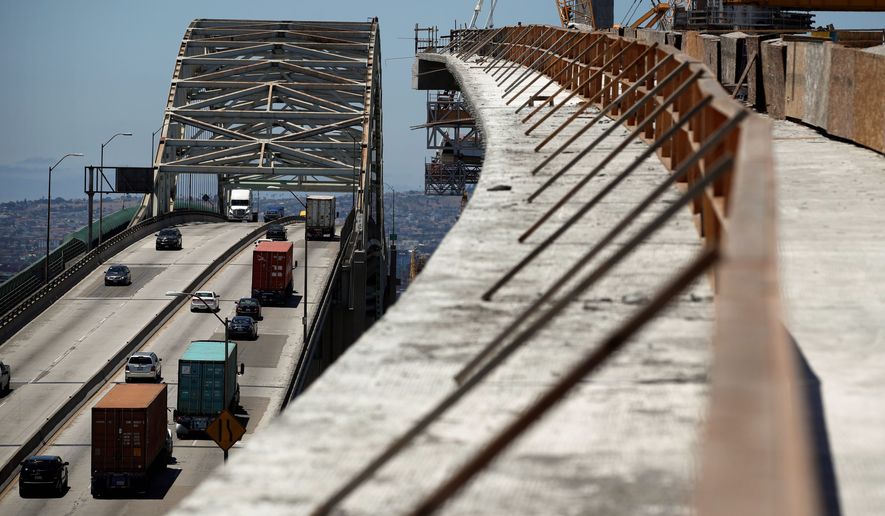Senate Republicans on Thursday called for spending upward of $568 billion to rebuild the nation’s roads and bridges, in sharp contrast to the $2.25 trillion desired by President Biden.
Notably, the plan is heavy on “real” infrastructure compared to the proposal offered by Mr. Biden, Republican senators said.
The proposal calls for spending $299 billion over five years on upgrading roads and bridges. It also includes $61 billion for public transit systems, $20 billion for rail programs such as Amtrak, and $44 billion for airport upgrades.
The Republican proposal also earmarks $65 billion for internet broadband, an issue with bipartisan support.
Although the Republican infrastructure proposal is smaller than that requested by the White House, lawmakers say it’s fiscally responsible and avoids a “one-size-fits-all” infrastructure policy.
“I think it’s important for you all to realize this is the largest infrastructure investment that Republicans have come forward with,” said Sen. Shelley Moore Capito, West Virginia Republican. “This is a robust package when we look at where we’re focusing our infrastructure needs.”
Mrs. Capito, who took the lead in authoring the proposal, argued the plan is a message to Mr. Biden and Democrats that there are areas of bipartisan consensus.
“We’re ready to sit down and get to work on this,” she said.
The GOP’s package comes as the infrastructure proposal submitted by Mr. Biden to Congress has generated little bipartisan support.
Republicans, in particular, have balked at the price tag of the White House‘s plan. Mr. Biden is proposing to spend $2.25 trillion over 10 years, with the majority of the plan being funded by tax increases.
Of that sum, only $621 billion would be used directly for transportation. Mr. Biden‘s plan allocates $115 billion to upgrade 20,000 miles of the nation’s highways and other surface roads. A further $20 billion is requested to improve road safety programs.
Mr. Biden‘s plan also prioritizes climate change-related spending. It includes $174 billion for electric vehicles and money for the federal government to transition its fleet away from gas-powered cars.
Surprisingly, Mr. Biden‘s proposal calls for less money for upgrading airports than the GOP plan. The White House wants to invest $25 billion across the nation’s airports, while the plan crafted by Mrs. Capito proposes $44 billion.
“We take the part of the president’s plan that most Americans agree is real, hard infrastructure, and we give it our touch,” said Sen. Roger Wicker, Mississippi Republican.
As such, the Republican plan does not include many of the “human infrastructure” components of Mr. Biden‘s plan.
For instance, the GOP plan does not incorporate the White House‘s $400 billion for caregiving for elderly Americans. Also not included are Mr. Biden‘s proposals to spend $100 billion on workforce development, including $12 billion to provide job training for felons, and $213 billion for public housing.
“When Americans think of rebuilding our nation’s infrastructure, they think of fixing roads, bridges, airports, ports, and waterways — not expanding the welfare state as the Democrats have proposed,” said Sen. Pat Toomey, Pennsylvania Republican.
The GOP proposal is unlikely to swing many Democrats in the 50-50 Senate.
“It goes nowhere near what has to be done to rebuild our crumbling infrastructure and the funding is totally regressive and anti-working class at a time of massive income and wealth inequality,” said Senate Budget Committee Chair Bernard Sanders, Vermont independent and a self-described socialist.
Democrats, led by Senate Majority Leader Charles E. Schumer of New York, have signaled a desire to pass the White House‘s infrastructure package through the budget reconciliation process. Following that course would mean Democrats only need a simple majority in the Senate, rather than the usual 60 votes required to overcome a filibuster.
• Haris Alic can be reached at halic@washingtontimes.com.




Please read our comment policy before commenting.